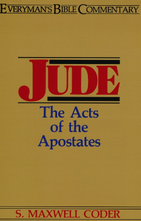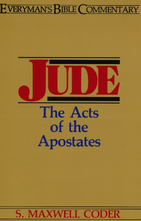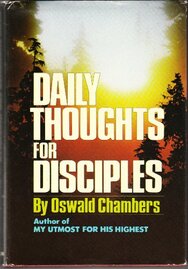Jude
The book of Jude is notoriously difficult to date, primarily because the Bible and tradition reveal so little about the personal details of its author while the book itself refrains from naming any particular individuals or places. The one clue available to present-day readers is the striking similarity between the books of Jude and 2 Peter. Assuming Peter wrote his letter first (AD 64–66), Jude probably wrote his epistle sometime between AD 67 and 80. [SOURCE: Charles R Swindoll: Jude]

The beginning of the age of the Church is described in the Acts of the Apostles. The end of the Church age is set forth in the Epistle of Jude, which might as well be called the Acts of the Apostates. The first book which can properly be said to contain Church history describes the deeds and teachings of men of God whom Christ began to build His church. The last epistle of the New Testament relates the deeds and teaching of evil men who will be living upon the earth as the history of the professing church comes to an end. Jude is the only book in all God's Word entirely devoted to the great apostasy which is to come upon Christendom before the Lord Jesus Christ returns. This brief message of twenty-five verses is the vestibule to the apocalyptic judgments unfolded therein. -S Maxwell Coder; Jude: The Acts of the Apostates; (C)1958
The Book of Jude is an important book for us today because it is written for the end times, for the end of the church age. The church age began at the Day of Pentecost. Jude is the only book given entirely to the great apostasy. Jude writes that evil works are the evidence of apostasy. He admonishes us to contend for the faith, for there are tares among the wheat. False prophets are in the church and the saints are in danger. Jude is a small but important book worthy of study, written for the Christian of today. [SOURCE: Got Questons? Book of Jude]
Major themes contained in Jude include:
- False Teachers - Jude warns against false teachers and leaders who reject the lordship of Christ, undermine the faith of others, and lead them astray. These leaders and any who follow them will be punished. We must staunchly defend Christian truth. Make sure that you avoid leaders and teachers who distort the Bible to suit their own purposes. Genuine servants of God will faithfully portray Christ in their words and conduct.
- Apostasy - Jude also warns against apostasy, the turning away from Christ. We are to remember that God punishes rebellion against him. We must be careful not to drift away from a faithfull commitment to Christ. Those who do seek to know the truth in God's Word are susceptible to apostasy. Christians must guard against any false teachings that would distract them from the truth preached by the apostles and written in God's Word. [SOURCE: Theopedia: Epistle of Jude]
|
Who are the "beloved in God the Father?" The Lord Jesus has given us the answer in John 17:20, 23. They are those whom God has loved as He loves His own Sin. They are all those who have believed on the Son of God through the word of His ambassadors. Our Saviour said: The Father himself loved you, because ye have loved me, and have believed that I came out from God (John 16:27).
|
God's people will need mercy in those days. Mercy is devine pity expressed itself in help for the needy. It presupposes need and helplessness. The word mercy stands over the threshold of this epistle of the apostasy. introducing a somber picture. Peace is the second great Bible word to be multiplied for believers in the last days. There is no place for the wicked (Isa 57:20,21) , but "we have peace with God through our Lord Jesus Christ."(Rom 5:1). The third word in our verse is "love" the bond uniting believers to their Lord and to one another. It is the first Commandment of Christ: "A new commandment I give unto you, that ye love one another....By this shall all men know that ye are my disciples" (John 13:34,35)

The word "kept" in the original expresses watchful care, or close attention. It is used of Peter's or Paul's imprisonments in Acts 12:5 and 25:4, 21. It is also used in I Peter 1:4 of our inheritance in Heaven for us.
A comparison between Jude and other New Testament letters reveals that this word "kept" does not appear in the salutation of any other epistle. Paul refers to his readers as "beloved" and "called," buy Jude adds the word "kept." It is because of the keeping work of God will be sorely needed by those who live in the last evil days of the great apostasy? A forward look to the return of Christ, for whom we are kept by the power of God (I Peter 1:5), will encourage every true believer. Jude supplies us with the inspired answer to the prayer of Christ: "Holy Father, keep through thine own name those whom thou hast given me" (John 17:11). An instructive word study is to be found here. Although we are kept continually, according to verse 1, we are nevertheless to keep ourselves in the love of God (v. 21). There is a Godward side to the blessed truth, and a manward side as well. By way of contrast, the fallen angels in verse 6 are said to be kept continually awaiting judgment, for the reason that they kept no their first estate. ....No matter how horrible the apostasy which may settle down upon the professing Church, we are kept for Jesus Christ. While we are being kept we are beloved of God the Father as His called and chosen ones. -S. Maxwell Coder; Jude: The Acts of the Apostates; (c)1958 |

Jude is the half-brother of Jesus Christ, having the same mother but not the same father, and the range of the date of this book is incredibly wide, with conservative scholars placing it between the years 70 to 90 AD. The reason I think the date is much later is because Jude refers to the Apostle’s predictions for the last days (Jude 1:18) as having come true (Jude 1:17), but clearly, Jude’s epistle is just as relevant today as in the day it was written. Jude begins by telling us who he is, that being “a servant of Jesus Christ and brother of James” (Jude 1:1), so Jude is a servant of Christ more than His half-brother. Jesus is not Jude’s brother anymore. He is his Lord and Savior. The Greek word for servant is actually slave (“doulos”), and there is a huge difference between being a slave and being a servant of Christ. A servant can quit their job, get fired, do a poor job, and go home after work, but a slave, particularly one of Christ’s, is owned by the Master, but the Master is good and He is merciful, and like a good master, He provides for all of our needs. Incidentally, in Jude’s day, slaves were more like family members than what we think of as slaves. They were sometimes adopted into the family. That was never so with a servant. --Jack Wellman;What a Christian Wants to Know
|
|
Matthew 12:18
Behold my servant, whom I have chosen; my beloved, in whom my soul is well pleased: I will put my spirit upon him, and he shall shew judgment to the Gentiles. |
1st Corinthians 15:58
Therefore, my beloved brethren, be ye stedfast, unmoveable, always abounding in the work of the Lord, forasmuch as ye know that your labour is not in vain in the Lord. |
2nd Thessalonians 2:13
But we are bound to give thanks alway to God for you, brethren beloved of the Lord, because God hath from the beginning chosen you to salvation through sanctification of the Spirit and belief of the truth: |
1st Timothy 6:2
And they that have believing masters, let them not despise them, because they are brethren; but rather do them service, because they are faithful and beloved, partakers of the benefit. These things teach and exhort. |
Hebrews 6:9
But, beloved, we are persuaded better things of you, and things that accompany salvation, though we thus speak. |
|
Jude 3:
Beloved, although I was very eager to write to you about our common salvation, I found it necessary to write appealing to you to contend for the faith that was once for all delivered to the saints. |
The truth of God is the foundation of all true religion. This is why the first commandment in Exodus 20, in order to love God with all your heart, soul and mind, is to have no other gods before him, and to take God as your God, in the way God has revealed himself. God has deposited his truth, his will, his word, into the hands of the church (into the very heart of the church). It has been delivered to them. “…that ye should earnestly contend for the faith which was once delivered unto the saints,” (Jude 1:3). |

It is the duty of every Christian to be an apologist. Some Christians immediately balk at this, not even aware of the meaning of the word. Simply, an apologist is not someone who “apologizes” for his faith, but rather, is someone who defends the faith once for all entrusted to the saints (Jude 1:3). It is commanded by God that all Christians follow 1 Peter 3:15, “But sanctify the Lord God in your hearts, and always be ready to give a defense to everyone who asks you a reason for the hope that is in you, with meekness and fear…” A ready defense is required of the Christian. That does not mean he must be a “professional theologian” in order to have an answer for the gainsayer. However, the Christian should at least be well prepared, or ready to give a defense. Every Christian is a theologian to some degree. It just depends on whether you think rightly about what you believe, and thus, successfully. -APM
|
Jude 4:
For certain individuals whose condemnation was written about long ago have secretly slipped in among you. They are ungodly people, who pervert the grace of our God into a license for immorality and deny Jesus Christ our only Sovereign and Lord. |

Two things to notice here. First, Jude wants believers to contend for the faith against other professing Christians. The foes here are those who are “inside” the church, not outside – ungodly people claiming to belong to Christ.
Second, the error that prompts Jude to exhort us is not the denial of foundational tenets of the gospel, but a twisted view of grace that excuses or celebrates sexual immorality. In other words, “contending for the faith” in the context of Jude 1 is less about doctrinal fidelity and more about Christian morality and praxis. The denial of Jesus Christ in this case isn’t creedal (as in 1 John 4, where the apostle warns against those who deny Christ’s humanity); it’s moral. By their advocacy and engagement in illicit sexual activity, they are functionally denying Jesus. -Trevin Wax; Gospel Coalition |
 Costi Hinn
Costi Hinn
In Jude 4 we read a sobering description of not merely sinful teaching, but the sinful lifestyles of false teachers. Jude writes, “For certain people have crept in unnoticed, those who were long beforehand marked out for this condemnation, ungodly persons who turn the grace of our God into indecent behavior and deny our only Master and Lord, Jesus Christ.”
The word for licentiousness he uses also translates as “sensuality” and means “lack of self-constraint which involves one in conduct that violates all bounds of what is socially acceptable.”(1) False teachers don’t only go too far with their doctrine, they always go too far with their deeds. They are marked by sins of “self-love” which is precisely why Paul warns Timothy that in the last days, men will be “lovers of self” (2 Timothy 3:2).
When false teachers speak out of the sides of their mouths and try to appear orthodox, there is still one surefire way to discern their deceptive patterns. One must look at their lifestyle in the wake of their claim to orthodoxy. If they appear to repent of a certain false teaching or veer away from it, one must ask, did they also repent of their greed, sexual immorality, homosexuality, and patterns of falsehood?
It is entirely convenient for a false teacher to edit a book secretly, or to quietly distance themselves from other false teachers who are bad for business, but does the deceptive teacher openly repent of their lifestyle of sin? If not, they are much more akin to Adam and Eve trying to foolishly hide from God in the garden (Genesis 3:8), rather than the Publican who openly cried out for mercy and identified himself as a sinner (Luke 18:9-14).
-Costi Hinn; For The Gospel; The Licentiousness of False Teachers 2.23.23
The word for licentiousness he uses also translates as “sensuality” and means “lack of self-constraint which involves one in conduct that violates all bounds of what is socially acceptable.”(1) False teachers don’t only go too far with their doctrine, they always go too far with their deeds. They are marked by sins of “self-love” which is precisely why Paul warns Timothy that in the last days, men will be “lovers of self” (2 Timothy 3:2).
When false teachers speak out of the sides of their mouths and try to appear orthodox, there is still one surefire way to discern their deceptive patterns. One must look at their lifestyle in the wake of their claim to orthodoxy. If they appear to repent of a certain false teaching or veer away from it, one must ask, did they also repent of their greed, sexual immorality, homosexuality, and patterns of falsehood?
It is entirely convenient for a false teacher to edit a book secretly, or to quietly distance themselves from other false teachers who are bad for business, but does the deceptive teacher openly repent of their lifestyle of sin? If not, they are much more akin to Adam and Eve trying to foolishly hide from God in the garden (Genesis 3:8), rather than the Publican who openly cried out for mercy and identified himself as a sinner (Luke 18:9-14).
-Costi Hinn; For The Gospel; The Licentiousness of False Teachers 2.23.23
|
Jude 1:5:
I will therefore put you in remembrance, though ye once knew this, how that the Lord, having saved the people out of the land of Egypt, afterward destroyed them that believed not. |
There is one great lesson for us in verse 5. After God saved a people for His name, He reserves the right to destroy that people if they become guilty of certain forms of unbelief or other sins to which unbelief leads. The word "apollumi" translated "destroyed" in Jude 5, is used elsewhere both of physical death, as in Luke 15:127 and of eternal death, as in John 3:16. In both places it is translated "perish." The context determines the meaning of the word. In I Corinthians 11:29, 30 it is revealed that sickness, weakness, and death had come upon those who ate and drank at the Lord's Supper in an unworthy manner. It was sin unto death. It resulted in physical death on the part of some who were called saints. (I Cor 1:2).
|
| Covenant Israel as those in the New Covenant Church had believers and unbelievers in its midst. See "The Church: Visible and Invisible: Is Everyone in the Church Saved?" below. God judged Israel for their unbelief when they refused to enter Canaan following the report of the faithful spies (Num. 13:25-14:38). The consequence for their sin: 40 years of wandering in the desert. Just as judgment fell on the apostate Israelites after their deliverance from Egypt, so also it will fall on apostate Church members yesterday, today, and forever (Heb. 3:7-12; cf. Heb.13:8). Though not explicit in the text, implicit is the emphasis of two locations (see Jude 1:6, 7). Israel was delivered from Egypt, with a promise of the Land of Promise (Num. 13:1). Davids clarifies: What, then, is Jude saying? After politely introducing this section of argumentation, he points out to his readers as his first piece of evidence that while the Lord on the one hand delivered the whole nation out of Egypt, he also destroyed in the wilderness those who did not believe, that is, were not committed to him/did not trust him (the issue is not intellectual belief but trust/commitment). This situation parallels that of the interlopers who are showing "unfaith" in that they are denying "Jesus Christ our only Sovereign and Lord." Thus the implication is that although they are among the people of God whom "the Lord" has saved out of (spiritual) "Egypt," they will be destroyed in the end because of their lack of commitment to (faith in) the Lord. |
|
Jude 6:
"And the angels who did not keep their proper domain, but left their own abode, He has reserved in everlasting chains under darkness for the judgment of the great day. |
Christians must all appear before the judgment seat of Christ. Unsaved men and women also face an inevitable hour of accounting. Just as the fallen angels are helpless to change one iota of what they did before the unannounced moment when God took them away, so it will be too late for men to repent of apostasy or other sin, when God's time has come for the end of their lives on earth |

God has established a proper relationship of marriage between men and women. Homosexuality establishes a relationship contrary to the roles that God has given to men and women. Just "as" the angels abandoned their given roles, the men of Sodom and Gommorah left their roles and sought flesh, which was not proper. It was the proper right of someone else; therefore, it was "strange flesh" (Jude 1:7 [Open in Logos Bible Software (if available)] ; II Peter 2:4-6 [Open in Logos Bible Software (if available)] ).
Homosexuality is parallel, or similar in principle to the angels' desertion of their place. The conjunction, "as", ties verse 6 of Jude 1 [Open in Logos Bible Software (if available)] to verse 7, implying that there is some similarity between the two sins. Moreover, the word for "own", or "proper" of verse 6 is the antithesis of the word for "strange" of verse 7, which means "another's", "someone else's". What is the exact similarity? In both verses, God gave a blessing with charge, but the charge was abandoned; consequently, God's wrath fell upon the angels and the men, who similarly sinned by deserting their divinely established place.
Homosexuality is just one of the ways we may abandon "our place". Anytime we question God's pattern, whether for the church, salvation, worship, or anything else, we have left our place, or our proper rule. We have assumed the place of the Lawgiver and tried to stand where only God has the right. In essence, all disobedience is a challenge to God's authority to rule in our lives as our Creator. Is that not what all sin is? Is it not an effort to rebel over the rightful rule and establish ourselves as absolute sovereigns of our own lives (Genesis 3:1-6 [Open in Logos Bible Software (if available)] )? It is man's desire to become a god unto himself that drives him to rebel and leave his place.
Homosexuality is parallel, or similar in principle to the angels' desertion of their place. The conjunction, "as", ties verse 6 of Jude 1 [Open in Logos Bible Software (if available)] to verse 7, implying that there is some similarity between the two sins. Moreover, the word for "own", or "proper" of verse 6 is the antithesis of the word for "strange" of verse 7, which means "another's", "someone else's". What is the exact similarity? In both verses, God gave a blessing with charge, but the charge was abandoned; consequently, God's wrath fell upon the angels and the men, who similarly sinned by deserting their divinely established place.
Homosexuality is just one of the ways we may abandon "our place". Anytime we question God's pattern, whether for the church, salvation, worship, or anything else, we have left our place, or our proper rule. We have assumed the place of the Lawgiver and tried to stand where only God has the right. In essence, all disobedience is a challenge to God's authority to rule in our lives as our Creator. Is that not what all sin is? Is it not an effort to rebel over the rightful rule and establish ourselves as absolute sovereigns of our own lives (Genesis 3:1-6 [Open in Logos Bible Software (if available)] )? It is man's desire to become a god unto himself that drives him to rebel and leave his place.
|
Jude 7:
Even as Sodom and Gomorrha, and the cities about them in like manner, giving themselves over to fornication, and going after strange flesh, are set forth for an example, suffering the vengeance of eternal fire." |
The adjective αἰώνιος in the Bible never means “eternal” unless it refers to God, who lends it the very notion of absolute eternity. In reference to life and death, it means “belonging to the future world.” It is remarkable that in the Bible only life in the other world is called ἀΐδιος, that is, “absolutely eternal”; this adjective in the Bible never refers to punishment, death, or fire in the other world, these are only called αἰώνια. (26)
Unlike αἰώνιος, ἀΐδιος belongs to the philosophical lexicon and means “eternal” in the strict sense. In Jude 7, the fire that consumed Sodom is declared to be an example of the πῦρ αἰώνιον, that is, the fire in the world to come. This cannot mean “eternal fire,” given that the fire that consumed Sodom and Gomorrah did not burn eternally, but it lasted only very little. The point is that it was not the fire of this world; rather, it was that of the other world, sent by God to destroy evil. This seems also to be the specific function of the fire in the next world, the πῦρ αἰώνιον that is announced in many passages of the NT. ---Ilaria L.E. Ramelli The Christian Doctrine of Apokatastasis: A Critical Assessment from the New Testament to Eriugena |
Sexual perversion may be defined as the diversion of sexual desire from a person of the opposite sex to a body of the opposite sex (rape, sadomasochism, paedophilia), or to a person of the same sex (homosexuality, paedophilia), or to an animal (bestiality), or to an inanimate thing (fetishism). Since perversions are unnatural, the penance for them is more severe than for fornication – but the same as for adultery. Thus the penance for adultery, sodomy and bestiality is fifteen years without communion, while for fornication it is seven years. -Orthodox Christianity

In this verse Jude presents another example of God's punishment of those who despise His laws and follow their sinful lusts. He mentions Sodom and Gomorrah and the surrounding towns. These urban sites existed in Abraham's lifetime and had a sordid history of sexual perversion (Genesis 13:13). Abraham's nephew Lot had been attracted to Sodom by the verdant pastureland surrounding the city (Genesis 13:10–11). At first, he settled near Sodom, but eventually moved into town, where he was "… greatly distressed by the sensual conduct of the wicked (for as that righteous man lived among them day after day, he was tormenting his righteous soul over their lawless deeds that he saw and heard)" (2 Peter 2:7–8). Ultimately God delivered Lot from Sodom but rained down burning sulfur on the perverse inhabitants of Sodom and Gomorrah and nearby towns (Genesis 19:24–25) --Bible Ref
|
Jude 8-10:
Likewise also these dreamers defile the flesh, reject authority, and speak evil of dignitaries. Yet Michael the archangel, in contending with the devil, when he disputed about the body of Moses, dared not bring against him a reviling accusation, but said, “The Lord rebuke you!” But these speak evil of whatever they do not know; and whatever they know naturally, like brute beasts, in these things they corrupt themselves. |
|
|
Jude:11:
Woe to them! They have taken the way of Cain; they have rushed for profit into Balaam’s error; they have been destroyed in Korah’s rebellion. |
There is nothing new about departure from the truth of Gods. It is as old as the history of the human race, for Cain was an apostate. The nation of Israel, the angels who sinned, and the people of Sodom and Gomorrah are familiar Old Testament examples of a falling away from God. We know these records well enough, but a continuous decay of our knowledge demands that we be reminded of them ibn view of the coming of apostasy into the professing Church. Every Bible believing Christian knows the necessity for daily reading of the Scriptures. God calls us to meditate on His Word dfay and night.
|
|
Jude 14:
Now Enoch, the seventh from Adam, prophesied about these men also, saying, “Behold, the Lord comes with ten thousands of His saints |
This would not be possible if the saints are sleeping in their graves. .
July 20, 2017: The Pathway: The prophecy of Enoch in Jude
|
Though Enoch’s account is not canonical, by the Holy Spirit we know that this particular passage of it is given of God. Enoch lived long ago, only seven generations after Adam. But evil was already rampant at that time. Indeed it would only get worse in the future (2 Timothy 3:13). Yet even that long ago the judgment of the evildoers of Jude’s day and of our own is foretold. When Christ returns, his holy ones will be with Him to mete out His judgment upon the ungodly for their ungodly deeds. Everything that every ungodly person ever said against God will be held to their account. The account of the believer is wiped clean, but the account of the ungodly is what will be used to sentence them into the eternal fire. It was true in Enoch’s day, and it is true for our day.[SOURCE: Relevant Bible Teaching: Jude]
There is debate whether or not Jude was actually quoting the apocraphal book of Enoch or something else. This debate aside, if this is a quote from the book of Enoch, it does not affect the doctrine of inspiration nor does it mean that the early church removed the book of Enoch because of its internal inconsistencies. First of all, the book of Enoch was not considered scripture by the Christian Church. There was some discussion on its canonicity by a few people, but the Christian Church did not include it in the Bible. Second, Jude only quoted something that was true in Enoch and it does not mean that Enoch was inspired. In fact, Paul quotes Epimenides in Titus 1:12 but that does not mean that Epimenides was inspired. [SOURCE: CARM: Jude 14 quotes the book of Enoch. Is it scripture?]
Whether his quotation is derived from tradition or from Enoch’s writing is uncertain. Justin Martyr, Irenaeus, Clement of Alexandria, and others mention the Book of Enoch. “The Apostolic Constitutions, Origen (contra Celsus), Jerome, and Augustine deny its canonicity” (Fausset's Bible Dictionary). [the Early church tradition favored Enoch and Elijah as the identity of the "two witnesses" in Rev. 11:3.]
“The Book of Enoch, which was known to the fathers of the second century, was lost for some centuries with the exception of a few fragments, and was found entire in a copy of the Ethiopic Bible, in 1773, by Bruce. It became known to modern students through a translation from this into English by Dr. Lawrence, in 1821. It was probably written in Hebrew. It consists of revelations purporting to have been given to Enoch and Noah, and its object is to vindicate the ways of divine providence, to set forth the retribution reserved for sinners, angelic or human, and "to repeat in every form the great principle that the world-natural, moral, and spiritual-is under the immediate government of God." (Vincent's Word Studies of the New Testament)
This book was discovered in an AEthiopic version. Bruce the Abyssinian traveler brought home three Ethiopic copies from Alexandria, which Lawrence translated in 1821. The Ethiopic was translated from the Greek, the Greek from the Hebrew. and was published with a translation by Dr. Laurence of Oxford, in 1821, and republished in 1832. A full account of it and its contents may be seen in an article by Prof. Stuart in the Bib. Repository for January 1840, pp. 86-137.
“The Slavonic Enoch. In the year 1892 the attention of Dr. Charles was directed to the fact that a Book of
Enoch was extant in Slavonic. Perusal proved it not to be a version of the book before us, but another and later pseudepigraphic book, taking, as the earlier had done, the name of Enoch. It is totally independent of the Ethiopic Enoch Book, as is seen by the most cursory consideration. It begins by giving an account of Enoch's instruction to his descendants how he had been taken up to the seventh heaven. Another manuscript adds other three heavens. In the third (?) heaven Enoch is shown the place of the punishment of the wicked. In the description of the fourth heaven there is an account of the physical conditions of the universe, in which the year is said to be 365 1/4 days; but the course of the sun is stated as a course of 227 days; which appears to be all that is accounted for.
Here the independence of the Slavonic Enoch is clear, as the Ethiopic Enoch makes the year 364 days. There are many points of resemblance which show that the writer of the Slavonic Enoch had before him the book which has come down to us in Ethiopic, but the relationship is not by any means so close as to be called dependence.” (from International Standard Bible Encyclopaedia)
The true prophecy of Enoch, though unrecorded, could have been handed down by tradition, as the Jews had a meticulous way of keeping both written and oral tradition. Paul mentions Jannes and Jambres the Egyptian magicians, names known in Jewish tradition, not from Scripture (2 Tim. 3:8). For him to do this and be accurate God would have had to confirm the tradition.
Even if Jude cites a passage from this non-canonical book, it does not mean he accepted the whole book as true, only this particular statement. I think it is more likely Jude did not lift this statement from the non-Biblical book of Enoch,. It was either something passed on orally or he received it as a direct revelation from God.[SOURCE: Let Us Reason: Did Jude quote from the book of Enoch, is this a reliable book?]
“The Book of Enoch, which was known to the fathers of the second century, was lost for some centuries with the exception of a few fragments, and was found entire in a copy of the Ethiopic Bible, in 1773, by Bruce. It became known to modern students through a translation from this into English by Dr. Lawrence, in 1821. It was probably written in Hebrew. It consists of revelations purporting to have been given to Enoch and Noah, and its object is to vindicate the ways of divine providence, to set forth the retribution reserved for sinners, angelic or human, and "to repeat in every form the great principle that the world-natural, moral, and spiritual-is under the immediate government of God." (Vincent's Word Studies of the New Testament)
This book was discovered in an AEthiopic version. Bruce the Abyssinian traveler brought home three Ethiopic copies from Alexandria, which Lawrence translated in 1821. The Ethiopic was translated from the Greek, the Greek from the Hebrew. and was published with a translation by Dr. Laurence of Oxford, in 1821, and republished in 1832. A full account of it and its contents may be seen in an article by Prof. Stuart in the Bib. Repository for January 1840, pp. 86-137.
“The Slavonic Enoch. In the year 1892 the attention of Dr. Charles was directed to the fact that a Book of
Enoch was extant in Slavonic. Perusal proved it not to be a version of the book before us, but another and later pseudepigraphic book, taking, as the earlier had done, the name of Enoch. It is totally independent of the Ethiopic Enoch Book, as is seen by the most cursory consideration. It begins by giving an account of Enoch's instruction to his descendants how he had been taken up to the seventh heaven. Another manuscript adds other three heavens. In the third (?) heaven Enoch is shown the place of the punishment of the wicked. In the description of the fourth heaven there is an account of the physical conditions of the universe, in which the year is said to be 365 1/4 days; but the course of the sun is stated as a course of 227 days; which appears to be all that is accounted for.
Here the independence of the Slavonic Enoch is clear, as the Ethiopic Enoch makes the year 364 days. There are many points of resemblance which show that the writer of the Slavonic Enoch had before him the book which has come down to us in Ethiopic, but the relationship is not by any means so close as to be called dependence.” (from International Standard Bible Encyclopaedia)
The true prophecy of Enoch, though unrecorded, could have been handed down by tradition, as the Jews had a meticulous way of keeping both written and oral tradition. Paul mentions Jannes and Jambres the Egyptian magicians, names known in Jewish tradition, not from Scripture (2 Tim. 3:8). For him to do this and be accurate God would have had to confirm the tradition.
Even if Jude cites a passage from this non-canonical book, it does not mean he accepted the whole book as true, only this particular statement. I think it is more likely Jude did not lift this statement from the non-Biblical book of Enoch,. It was either something passed on orally or he received it as a direct revelation from God.[SOURCE: Let Us Reason: Did Jude quote from the book of Enoch, is this a reliable book?]
|
Jude:15-19:
to judge everyone, and to convict all of them of all the ungodly acts they have committed in their ungodliness, and of all the defiant words ungodly sinners have spoken against him.” 16 These people are grumblers and faultfinders; they follow their own evil desires; they boast about themselves and flatter others for their own advantage. 17 But, dear friends, remember what the apostles of our Lord Jesus Christ foretold. 18 They said to you, “In the last times there will be scoffers who will follow their own ungodly desires.” 19 These are the people who divide you, who follow mere natural instincts and do not have the Spirit. |

Over the years, particularly in my nearly 40 years of pastoral ministry, I have often failed to understand that the enemy IS an enemy. That is to say, I have explained away many of the more deceptive, confusing, disguised attacks as being far less than they really were. I overlooked. I excused. He was having a bad day. She is a Christian but is just a difficult person who requires my patience. He did this and that thing, said this or that troubling statement, but all in all he is a brother in Christ. So I overlooked. I excused. I even defended these kind of people when others took notice of their behavior. “Well she means well.” “Yes, I know, he has his glitches.”
What was my problem? My problem was I did not know the real nature and intent of such people. I thought I knew them, but I did not. I did not comprehend, nor did I even want to understand, that this kind of person was in fact acting very intentionally and willfully. I did not understand that he/she was an enemy. A narcissist. A sociopath. A person demanding to be worshipped and served and who punished anyone who they perceived had failed to deliver that worship and service. I did not understand, in other words, that I was actually dealing with a wicked person. -Unholy Charade |
|
Jude 20:
But ye, beloved, building up yourselves on your most holy faith, praying in the Holy Ghost” |

That means to confess and repent of un-confessed sin and clothe yourselves in righteousness. When it seems as though you have difficulty getting into the presence of God, begin by sitting still and begin to speak in your heavenly language (tongues) for it makes your faith stronger. -Igniting the Fire
|
Jude 21-22:
keep yourselves in God’s love as you wait for the mercy of our Lord Jesus Christ to bring you to eternal life.
22 Be merciful to those who doubt; 23 save others by snatching them from the fire; to others show mercy, mixed with fear—hating even the clothing stained by corrupted flesh.
keep yourselves in God’s love as you wait for the mercy of our Lord Jesus Christ to bring you to eternal life.
22 Be merciful to those who doubt; 23 save others by snatching them from the fire; to others show mercy, mixed with fear—hating even the clothing stained by corrupted flesh.















